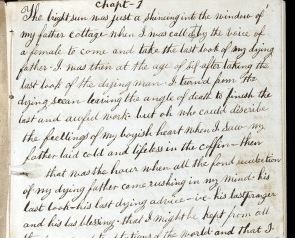
NEW HAVEN, Conn. (AP) — Yale University announced Thursday that research has determined an 1858 manuscript it acquired is the earliest known prison memoir written by an African-American.
The book-length manuscript, titled “The Life and Adventures of a Haunted Convict” and written under the name Robert Reed, describes the author’s experiences while incarcerated in New York from the 1830s through the 1850s. It was acquired by Yale’s Beinecke Rare Book & Manuscript Library in 2009.
English and American studies professor Caleb Smith authenticated the manuscript and identified its author as Austin Reed, a free black man who was born in upstate New York, Yale said.
“Finding any new text by an African-American author of the 19th century is significant, but this memoir has so much to say about captivity, freedom and human rights,” said Smith, who’s preparing the manuscript for publication. “It is a truly remarkable discovery.”
The key piece of evidence in the authentication process was an 1895 handwritten letter, preserved in state files, from Austin Reed to the warden of a juvenile reformatory where he served earlier that recounts some of his story and inquires whether the institution has maintained any records of his time as an inmate, Yale said.
Reed’s account aimed to expose the brutal punishments at Auburn State Prison, including whippings and what were called shower baths, similar to water-boarding, a type of simulated drowning. He described what happened after he confronted a warden with a knife:
“Stripping off my shirt the tyrantical curse bounded my hands fast in front of me and ordered me to stand around,” he wrote. “Turning my back towards him he threw sixty seven lashes on me according to the orders of Esq. Cook. I was then to stand over the dreain while one of the inmates was my back in a pail of salt brine.”
Yale American history professor David Blight called the Reed prison narrative manuscript “a revelation.”
“Nothing quite like it exists,” said Blight, director of the Gilder Lehrman Center for the Study of Slavery, Resistance, and Abolition. “Reed is a crafty and manipulative storyteller, and perhaps above all he left an insider’s look at the American world of crime, prisons and the brutal state of race relations in the middle of the 19th century.”
h/t – huffingtonpost









